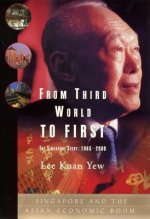
Kód: 04669015
Disempowered Development of Tibet in China
Autor Andrew Martin Fischer
Series: Studies in Modern Tibetan Culture, Lexington Books Weatherhead East Asian Institute, Columbia University Since the central government of China started major campaigns for western development in the mid-1990s, the economies ... celý popis
- Jazyk:
 Angličtina
Angličtina - Vazba: Brožovaná
- Počet stran: 462
Nakladatelství: Lexington Books, 2013
- Více informací o knize

Mohlo by se vám také líbit
Dárkový poukaz: Radost zaručena
- Darujte poukaz v libovolné hodnotě a my se postaráme o zbytek.
- Poukaz se vztahuje na celou naši nabídku.
- Elektronický poukaz vytisknete z e-mailu a můžete ihned darovat.
- Platnost poukazu je 12 měsíců od data vystavení.
Více informací o knize Disempowered Development of Tibet in China
Nákupem získáte 236 bodů
 Anotace knihy
Anotace knihy
Series: Studies in Modern Tibetan Culture, Lexington Books Weatherhead East Asian Institute, Columbia University Since the central government of China started major campaigns for western development in the mid-1990s, the economies of the Tibetan areas in Western China have grown rapidly and living standards have improved. However, grievances and protests have also intensified, as dramatically evidenced by the protests that spread across most Tibetan areas in spring 2008 and by the more recent wave of self-immolation protests that started in 2011. This book offers a detailed and careful exploration of this synergy between development and conflict in Tibet from the mid-1990s onwards, when rapid economic growth has occurred in tandem with a particularly assimilationist approach of integrating Tibet into China. Fischer argues that the intensified economic integration of Tibet into regional and national development strategies on these assimilationist terms, within a context of continued political disempowerment, and through the massive channeling of subsidies through Han Chinese dominated entities based outside the Tibetan areas, has accentuated various dynamics of subordination and marginalization faced by Tibetans of all social strata. Whether or not these dynamics are intended to be discriminatory, they effectively accentuate the discriminatory, assimilationist and disempowering characteristics of development, even while producing considerable improvements in the material consumption of local Tibetans. In particular, strong cultural, linguistic and political biases intensify ethnically-exclusionary dynamics among middle and upper strata of the Tibetan labor force, which is problematic considering the rapid shift of Tibetans out of agriculture and towards the highly subsidy-dependent sectors of the economy, especially in urban areas. The combination of these disempowering dynamics with the sheer speed of dislocating and disembedding social change provides important insights into recent tensions given that it has accentuated insecurity while restricting the ability of Tibetan communities to adapt in autonomous and self-determined ways. The study represents one of the only macro-level and systemic analyses of its kind in the scholarship on Tibet, based on accessible economic analysis and extensive interdisciplinary fieldwork. It also carries much interest for those interested in China and in the interactions between development, inequality, exclusion and conflict more generally.
 Parametry knihy
Parametry knihy
Zařazení knihy Knihy v angličtině Humanities History Regional & national history
2362 Kč
- Plný název: Disempowered Development of Tibet in China
- Podnázev: A Study in the Economics of Marginalization
- Autor: Andrew Martin Fischer
- Jazyk:
 Angličtina
Angličtina - Vazba: Brožovaná
- Počet stran: 462
- EAN: 9780739134382
- ISBN: 0739134388
- ID: 04669015
- Nakladatelství: Lexington Books
- Hmotnost: 740 g
- Rozměry: 227 × 163 × 27 mm
- Datum vydání: 20. December 2013
Oblíbené z jiného soudku
-

Ten Myths About Israel
336 Kč -

Decline and Fall of the Roman Empire
130 Kč -

Strange Death of Europe
410 Kč -

Citizens
543 Kč -

Last Voyage of the Lusitania
486 Kč -

Londoners
316 Kč -

Secret History
303 Kč -

In The Garden of Beasts
327 Kč -

Reverence for Wood
215 Kč -

Polish Saber
1520 Kč -

Wages of Destruction
543 Kč -

From Third World to First
736 Kč -

Interpreting Our Heritage
487 Kč -

Introduction to the History of the Principal Kingdoms & States of Europe
405 Kč -

Voices of the Foreign Legion
406 Kč -

Covering Islam
407 Kč -

Maurice's Strategikon
736 Kč -

Napoleon's Master
614 Kč -

Becoming Indian
944 Kč -

Penguin Historical Atlas of Ancient Egypt
457 Kč -

Blind Mans Bluff
343 Kč -

Middle Byzantine Historians
5094 Kč -

Thirteenth Tribe
420 Kč -

Anatomy of the Nuremberg Trials
412 Kč -

Twilight of the Romanovs
943 Kč -

Hundred Years' War on Palestine
338 Kč -

Ethnic Cleansing of Palestine
357 Kč -

Palestine
534 Kč -

The Secret Diaries Of Miss Anne Lister: Vol. 1
304 Kč -

Giza Power Plant
365 Kč -

The Balkans, 1804-2012
543 Kč -

Age Of Revolution
410 Kč -

The Thirteenth Tribe
308 Kč -

Millennium
358 Kč -

Alexiad
423 Kč -

Heraclius, Emperor of Byzantium
774 Kč -

1948
631 Kč -

Annals of Imperial Rome
357 Kč -

Strike and Hold
703 Kč -

Diana: Her True Story - In Her Own Words
306 Kč -

How to be a Victorian
357 Kč -

The Oxford History of Ancient Egypt
383 Kč -

Line in the Sand
265 Kč -

Rise And Fall Of The Third Reich
543 Kč -

History of Japan
405 Kč -

Illustrated Encyclopedia of Uniforms of the American War of Independence
543 Kč -

Olympic, Titanic, Britannic
750 Kč -

Medieval Monsters
277 Kč -

Vanished Kingdoms
514 Kč
Osobní odběr Praha, Brno a 12903 dalších
Copyright ©2008-24 nejlevnejsi-knihy.cz Všechna práva vyhrazenaSoukromíCookies






 Vrácení do měsíce
Vrácení do měsíce 571 999 099 (8-15.30h)
571 999 099 (8-15.30h)